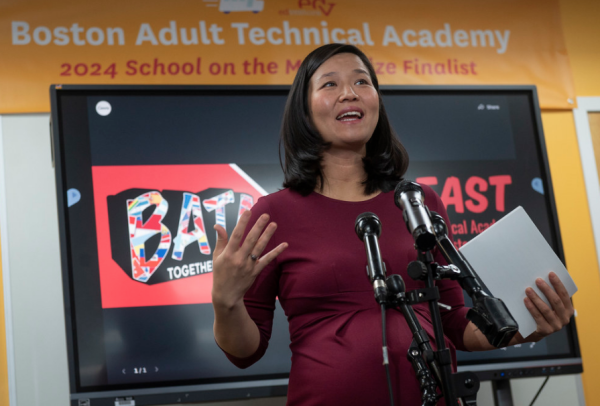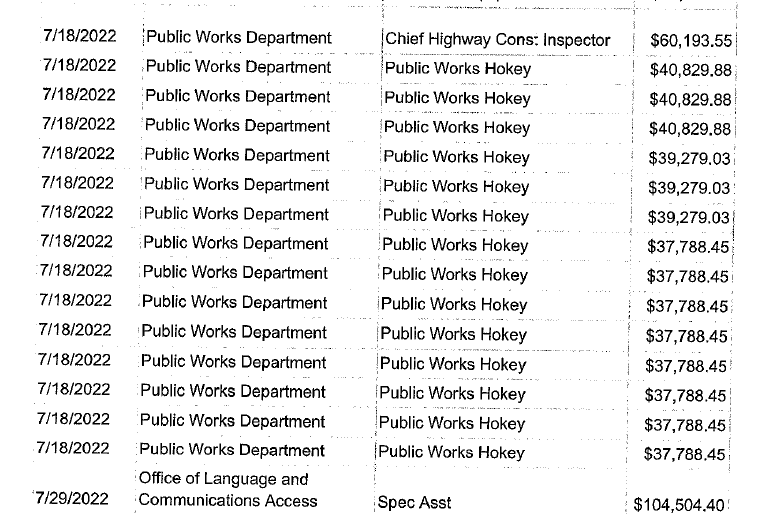January 14, 2025

Mayor Michelle Wu joined Boston Public School Leaders for the opening of Boston Adult Technical Academy in East Boston on Friday, Jan. 10. Mayor’s Office Photo by Jeremiah Robinson
Basic services, public safety account for most positions
Last October, the Boston City Council — at the behest of Councillor Erin Murphy and other council colleagues— asked for full accounting of new permanent hires made under the first three years of the Wu administration.
On Tuesday, the mayor’s team responded with a seven-page letter and 13-page table of positions that breaks down the “new workforce headcount” — 301 positions in total with an average salary of $84,781— and offers a cost-benefit analysis and more context about why they made select investments in personnel.
“We are proud of our City workforce who keep Boston running and deliver excellent municipal services each and every day and have worked diligently throughout our administration to support our workforce,” Wu wrote in the letter, which was delivered to city councillors on Tuesday, according to Wu’s aides.
The response to the council’s formal 17F request also comes the day after the mayor gave birth to her third child, a baby girl born on Monday afternoon. It also comes as Wu and her allies have renewed a legislative push for tax relief for Boston residents and mounted a spirited response to critics who suggest that that the city should trim costs from the budget rather than make new hires.
The mayor makes the case that the new hires have been essential to improving an array of services, including roles that were left depleted or unfilled during the Covid years.
Importantly, the 17F response does not include hires made for the Boston Public Schools and so-called “quasi” agencies, like the former Boston Planning and Development Agency, which are not part of the “general fund” of the city budget, and therefore not covered in the Council’s request.
Following are some of the key statements the mayor included in her letter to the councillors:
• The total new salary cost of the 301 new positions is roughly 0.6 percent of Boston’s FY25 operating budget. Most of those jobs were filled in the first two years of her administration— 112 in 2022 and 135 in 2023—a time when the city was still rebuilding staffing levels from the Covid pandemic and “multiple mayoral administration changes” that created vacancies that Wu and her team hustled to fill. New hires slowed in 2024, with 54 new positions filled.
• The largest slice (23 percent) of the 301 hires— 67 individuals — belong to the “Basic City Services” category, which include positions like 911 operators, street cleaners known as “hokeys” who have doubled on Wu’s watch in an effort to improve sanitation across the neighborhoods, and more 311 operators tasked with fielding and responding to constituent complaints.
• Human service jobs— including librarians and support staff for BCYF community centers and a new veterans’ liaison— accounted for roughly 13 percent of the new hires; public safety jobs— including a new Fire Department cadet program and a coordinator for citywide emergency preparedness – accounted for roughly 13 percent as well.
• The rates of job growth at City Hall in 2022 and 2023 were roughly 1.4 percent and 1.7 percent, respectively, which Wu officials say mirrors the municipal growth rate of 1.5 percent reported nationally by the US Census bureau.
A full breakdown of specific departments and sectors is available for review in the letter, which The Reporter obtained.
“The personnel investments that we have made are necessary to city operations,” said Alex Lawrence, the Chief People Officer for the city who spoke to The Reporter this week. “They are things that provide incredibly important services that our constituents rely on. And a lot of them are things that are cost effective in the long run. They are positions where we've either had deferred maintenance or there were places where we weren't [providing] acceptable service levels.
She added: “The overall story that we're telling in this response to the 17F is that in investments in personnel, which make up a very, very, very small fraction of the overall budget, are incredibly responsible investments that help provide critical services for our residents.”
In some instances, the Wu team argues, the surge in new hires early in her term reflected the need to “catch up” on services that were suspended or reduced during the pandemic, including those at branch libraries and BCYF community centers.
Among the new hires, for example, are employees whose focus is on facility maintenance in city-owned buildings, jobs that Wu’s team says were typically outsourced to contractors in previous administrations.
José Massó, the city’s chief of Human Services, whose oversight includes community centers, said the result has been better response times to make needed repairs.
“It has added to the efficiency in terms of the speed on which things got fixed,” he said. “We quickly identified in the summer of ’22 how many of the facilities were impacted due to deferred maintenance.”
As a result of new permanent hires, Massó said, “we've seen a lot of our on-site issues be remedied much quicker than they were in the past.”
He added: “It has also allowed us to be able to focus on other key areas of property management. We're now able to focus on pools, for example, and we're able to bring the expertise in that specific area… And so with focused intention, focused investments from this administration we’ve to be able to respond to the challenges that Covid presented.”
The improved staffing levels, Massó said, also means more accessible hours for city residents at community centers and libraries. “If we invest in staff, what that allows us to do means we can increase the amount of hours in which they can access our resources,” he noted. “That means that we can increase the amount of days that they can access our resources. So even if it's not structured programming, just to share fact that we have a safe welcome space for them to be able to join is added value.”
Mike Brohel, the superintendent of Basic City Services, pointed to the hiring of 15 additional “hokeys” under his department as another investment to boost constituent services.
“With that workforce going from what was about 7 to 8 to now 21 or 22, which is significant [in that] every neighborhood gets a hokey” and extra cleaners who focus on main streets and business districts, with problems addressed and resolved more quickly, Brohel said.

A section of Mayor Wu's report on city hirings shows a section detailing "hokey"hirings in July 2022.
“These 15 hokeys are part of a team that … resolve cases, whether it be a dead squirrel, a dumped mattress, any types of trash. They're able to respond to it and case gets closed out."
The turnaround time, he said, “is both quick but also thorough. We're averaging right now less than one day to close out a request for street cleaning. You're just able to resolve things faster. You're able to get that resolution, that case closure, that much faster.”
That three full-time arborists have been added to the city payroll, he said, not only improves responsiveness to resident tree requests, but the hirings also can improve performance.
“You've got city employees, city residents invested in doing the work,” said Brohel. “I would challenge anyone to watch that work and see that square and see that main thoroughfare and watch the pride that a person takes and watch them interact with their colleagues and watch them look at a career ladder.”
The Wu letter is careful to note that funding for new positions was “appropriated during the regular budgetary process and vetted and voted on by the City Council.”
In a response sent to the Reporter on Tuesday, Councillor Erin Murphy said she remained concerned about the mayor's personnel spending "particularly when it comes to the balance between middle and upper management roles versus entry-level jobs."
"While these positions may serve important functions, they do not address the critical need to expand entry-level roles that provide residents with an opportunity to gain a foothold in stable city jobs," said Murphy, who called for a "re-evaluation of hiring priorities."
District 3 Councillor John FitzGerald, who represents a large section of Dorchester, said he was still reviewing elements of the plan.
"I appreciate all the work that went into creating this report," FitzGerald told The Reporter. "Our job is to always make sure the citizens' tax dollars are going to provide the services they most need.
"There are some good services in here, so it's always important to ask these questions."
Reporter correspondent Chris Lovett contributed reporting to this article.
| Attachment | Size |
|---|---|
| 877.81 KB |


